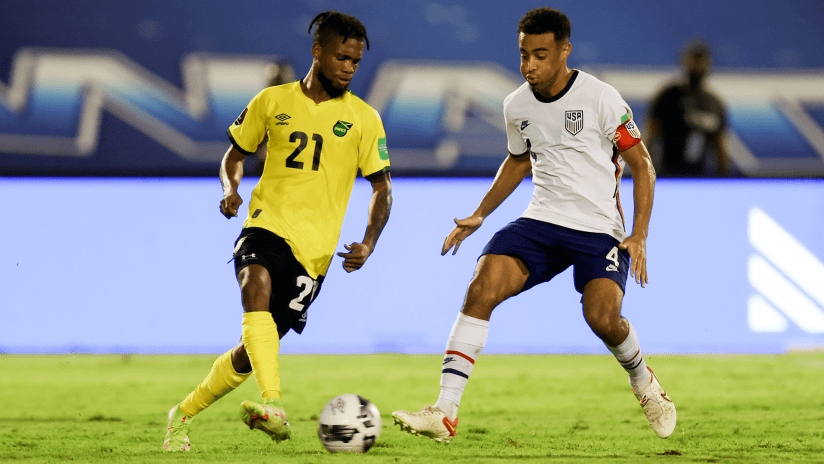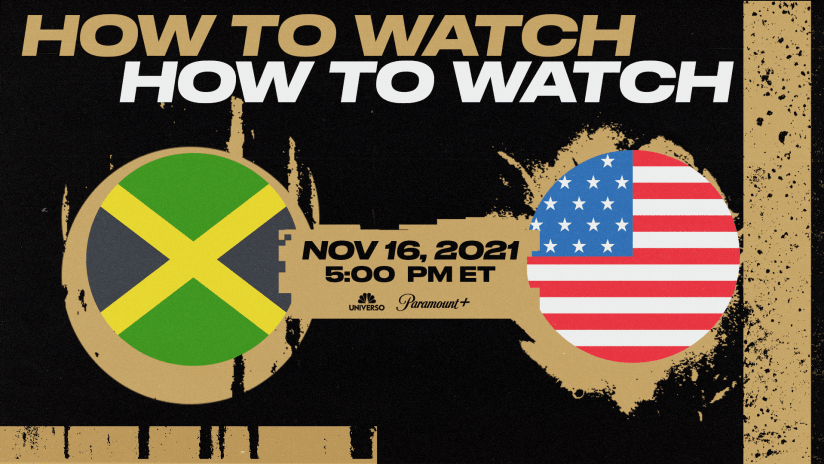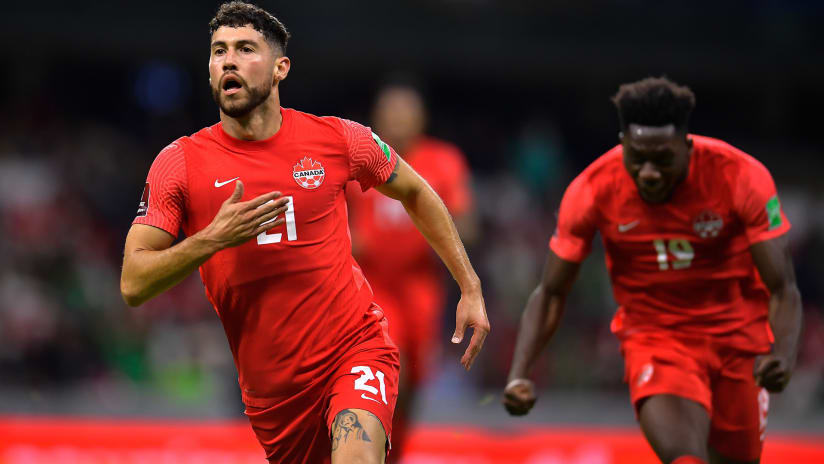PAUL HARVEY COULDN'T UNDERSTAND why people weren't taking him seriously.
A Jamaican-born soccer fanatic who first came to the United States in the 1980s to play collegiately, Harvey had cultivated relationships with several American college coaches over the last three decades. He’d developed a reputation as trustworthy assessor of talent on the island, cautious enough not to get caught up in local hype, but also willing to push the right player.
But this time, it was different. This time, hype and talent had coalesced into one irresistible package. Harvey just couldn’t hold back.
“He’s a gift from God,” Harvey gushed to one coach.
“He’s the the best thing since sliced bread,” he told another.
“There will never be another goalkeeper like this for at least 10 years,” he’d make sure to include in his sales pitch.
Harvey was talking about Andre Blake. But despite the glowing praise, only one college coach jumped at the lanky netminder – the University of Connecticut’s Ray Reid, who likes to recruit from the Caribbean.
“Most did not have a clue or give Blake the respect he deserved,” Harvey says now. “I knew he was a magician in the goal.”
Years later – after an All-American career at UConn, the honor of being the first-ever goalkeeper taken first overall in the MLS SuperDraft, and a starting spot with the Philadelphia Union – Blake has broken out in a big way. Unknown no more, the 25-year-old was Jamaica’s undisputed No. 1 at this summer's Copa America Centenario, started in the AT&T MLS All-Star Team a month later, and has since emerged as perhaps the most exciting goalie in MLS.
“Many of those coaches called me after they saw Blake play,” Harvey laughs. “And they said, ‘Wow, I was dead wrong. I made a big mistake.’”
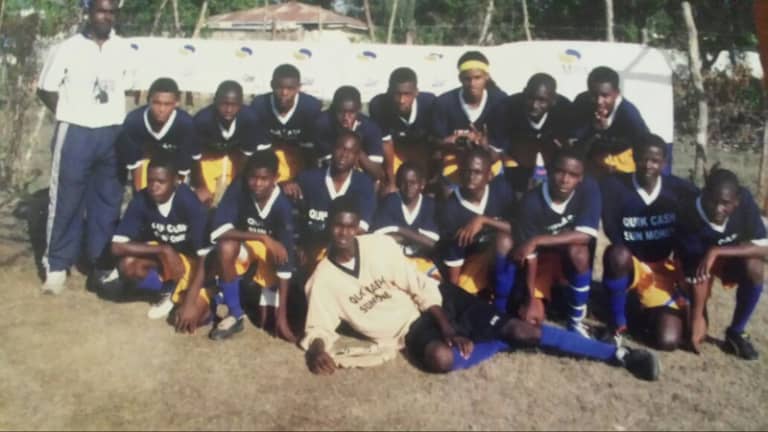
Blake grew up with six brothers in May Pen, Jamaica. He wasn't always a goalkeeper, but he always spent the majority of his free time on the field. He's pictured above (first row, second from right).
THINGS WEREN'T ALWAYS EASY FOR ANDRE BLAKE growing up in May Pen, a small city in the Clarendon parish of Jamaica, about an hour’s drive from Kingston, the country’s capital. He had six brothers, and although he lived in a loving home, his parents couldn’t provide certain luxuries like dinners out or the latest fashions.
“Growing up, we didn’t have much,” Blake says. “So that was one of my biggest motivations – to be able to play professional soccer. That was a big goal for me, something that motivated me every day.”
Having so many brothers helped fuel that desire and hone his skills. Every day, Andre would walk to the dirt park near his house to kick a ball around and challenge himself. If he went with his two cousins, he’d want to play a 2-v-1 game with him as the “1.” If he went with his brother Everton – four years his elder – he wouldn’t shy away from going up against bigger kids, often nearly a decade older.
“I loved soccer,” says Everton, who now works as an office manager in Connecticut. “But I looked at it like a hobby. Andre was the opposite. He knew that was what he wanted to do.”
Everton, a midfielder, forged a path for Andre to follow when he left Jamaica to play college soccer at Lake Erie, a small D-II school in Ohio. Shortly before he left for the states, Everton remembers Andre suffering one of his biggest disappointments when he was left off a youth Jamaican national headed overseas for games against international competition.
“I think that was the turning point,” Everton says. “He went back out and did what he had to do to get bigger and stronger. And look at him now.”
It’s harder to find the defining moment in his evolution as a goalkeeper – although Everton says he first realized that could be his younger brother’s fate when he saw him play wicket-keeper in cricket (similar to a catcher in baseball). Andre captained his high-school cricket team at Clarendon College. He was also a big-time goal-scorer on the soccer field during the cricket off-season.
“When I was in primary school, whenever we needed goals, they’d put me up top and I would just run and go score goals,” Andre remembers. “Then they’d put me back in goal and no one would score. That was our strategy. That’s how we’d normally win games.”
When it came time to make a choice, Blake picked soccer over cricket. And, with the urging of the U-20 Jamaican national team coach, he stopped playing in the field to focus strictly on being a goalkeeper.
That’s when his stock skyrocketed and a high school coach named Jackie Walters picked up the phone and told his friend Paul Harvey there was a star ’keeper in Clarendon. In particular, Walters praised the young man’s character, which he called “impeccable.”
“When I talked to Blake for the first time, he was known in Jamaica for being the best goalkeeper in the country,” Harvey says. “But he did not come across as someone who was cocky. He came across as someone very humble, very respectful.”
Blake was also very determined, knowing he would have to leave the island to launch a professional career and, as he puts it, “change my family’s life.” Initially, he hoped to play in Europe but soon realized that was “almost impossible” for a player without any senior national team caps.
So he accepted an offer from Ray Reid and UConn, even though his official visit to the campus was marked by sub-freezing temperatures and he knew American college courses would be a challenge.
No matter, the United States would be the next stop on his journey.
“I was mentally prepared,” Blake says, “for whatever was to come.”
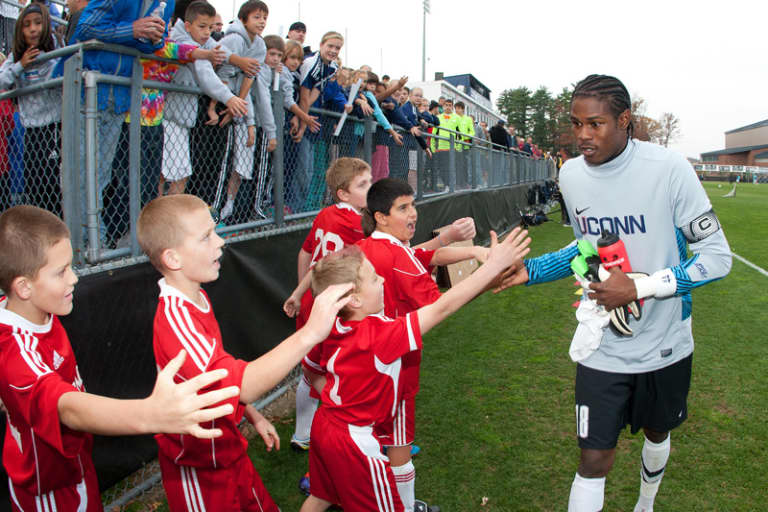
Connecticut was a departure from what Blake knew, but he thrived immediately with the Huskies. Blake posted 36 shutouts during his three years as a starter and was twice named the BIG EAST Goalkeeper of the Year, as well as the American Athletic Conference Goalkeeper of the Year. Courtesy of UConn Athletics
YOU GET THE SENSE THAT EVERYONE WHO SAW BLAKE PLAY in college has a favorite moment, a story they like to tell about how absurdly good the Jamaican was while patrolling UConn’s net.
Union rookie Keegan Rosenberry certainly has one. It was during a UConn-Georgetown game in 2012 when Blake was a sophomore, and Rosenberry a freshman at Georgetown. The game was a showdown between two of the top three teams in the country at the time, but it was still Blake who stole the show in a 2-1 Georgetown victory.
“I think he had the best game I’ve ever seen a collegiate goalie have,” says Rosenberry, who saw plenty of college standouts during his four years with the Hoyas.
“I don’t normally go crazy over saves, but I look back on that game and I’m like, ‘Wow,’” Blake says. “Keegan always talks about it. He’s like, ‘Dude, I still don’t understand. Everyone started celebrating our goal but the ball wasn’t in the net.’”
After that game, Reid didn’t hold back his praise for Blake, telling the UConn website, “He’s the best goalkeeper in America. Plain and simple.” It was a stance he maintained throughout Blake’s college career, especially the next season, when the Jamaican emerged as an NSCAA First Team All-American and a MAC Hermann Trophy semifinalist.
And like everyone else, he too has a favorite Andre Blake story, recalling the time the Jamaican made a point-blank save in overtime vs. top-seeded UCLA in the third round of the NCAA tournament – a game UConn ended up winning on penalty kicks.
“He made tons of saves,” Reid says. “But that one I remember.”
That upset would prove to be Blake’s last win at the college level as the Huskies were bounced in the next round by Virginia, and the goalkeeper decided to leave school a year early to turn pro. By then, plenty of MLS coaches were closely scouting the Jamaican, but Reid still believed that the attention came a little late. Like Harvey, he often felt Blake didn’t get the respect he deserved.
“A lot of people were asking about him, but we had known this for three years,” Reid says. “People didn’t want to listen, but he knew he was special.”
Blake’s jaw-dropping athletic ability and his knack for makingrub-your-eyes-in-disbelief saves fueled that reputation. But how the Jamaican adapted to UConn off the field played a big part in solidifying himself as a next-level prospect as well.
“I’m sure it was a bit of a transition,” Reid says. “But he has such a great personality, he’s such a likable young man, that he hit it off big on campus right away.
“He’s a great young man – humble, driven, even-keeled, soft-spoken, the whole deal.”
Those personality traits came in handy as Blake navigated the tricky pre-draft process, meeting with teams and trying to figure out where he might land. Based on his dominant collegiate career and how well he played at the MLS Combine, he figured he’d be picked early in the draft.
But he didn’t think he’d go No. 1 – and he never expected to land in Philly, either.
“I didn’t meet with the Union until the last minute, and they didn’t even seem that interested,” Blake says. “Or maybe that’s the way they played it off.”
Other people were equally surprised, considering the Union’s top need at the time was center back, and two center backs – Steve Birnbaum and Christian Dean – went No. 2 and No. 3, respectively. Plus, the Union already had a promising young goalkeeper in Zac MacMath, who was actually in the draft room at the time. Even still, Philly decided to not just target Blake but also make an aggressive trade up to the No. 1 spot to do so.
Why’d they do it?
“He separated himself from the rest of the class in that draft,” explains Union head coach Jim Curtin, an assistant coach with the team at the time. “That’s tough for a goalie. I think they really have to stand out even more. He did that, which is no easy task. He made some saves at the combine that were next level.”
Now a pro, Blake made his Jamaican senior national team debut less than two months later, and figured he would compete for Philly’s starting goalkeeping spot right away as a rookie.
“It’s always great to make history,” he says. “For me, that was one of the best days of my life.”
Everything, it seemed, was falling into place. Or was it?
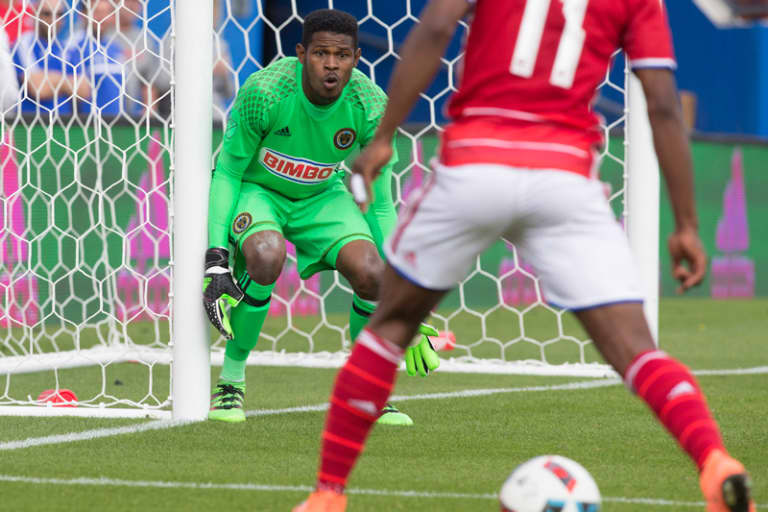
Once healthy and secure as the Union No. 1, Blake has turned in the type of performances that have Philly head coach Jim Curtin dreaming big. “My hope for him is to someday play at Manchester United,” Curtin says. “I think he has that ability.” USA TODAY Sports
ANDRE BLAKE WAS BURSTING WITH ANTICIPATION as he entered Jim Curtin’s office in late July of 2014.
The Jamaican, MacMath’s backup up to that point, had just showcased his enormous potential with six impressive saves in a 1-0 loss to Crystal Palace days earlier. He was, by all accounts, the highlight of an otherwise drab friendly with the English Premier League club. Perhaps the coaches had taken notice and decided to elevate him to starter?
“I came in on Monday and Jim said, ‘I need to talk to you,’” Blake recalls. “I was like, ‘OK, here we go, this is the news telling me I got the starting spot.’ Then I went in and he was like, ‘We’re bringing in a goalkeeper.’ And I was like, ‘Wow.’”
That goalkeeper was Rais Mbolhi, a high-priced Algerian best known in US circles for giving up the famous Landon Donovan goal at the 2010 World Cup. Mbolhi had a solid international pedigree, but the move was still a puzzling one, considering the Union were grooming two young goalkeepers in MacMath and Blake.
Just like that, instead of rising to the starting spot as he had hoped, Blake became a third-string ’keeper – behind a World Cup vet who had just signed a long-term deal, and another goalkeeper that was even younger than himself.
Blake admits today that he “didn’t have much of a relationship” with Mbolhi, whose now-infamous signing could have been partially justified had he taken on a mentoring role. Instead, Blake was left on his own to try to figure out how to approach the situation, leaning on advice from his friends, family and mentors. Despite the disappointment, he never allowed himself to stew.
“He handled it like a pro,” says Curtin, who was Philly’s interim head coach at the time, and an assistant when the Union’s negotiations with Mbolhi began. “He never complained. He never pouted in training. He just came with a really good mindset. He worked hard every day. He might not realize it now but those years, they kind of form you as a player and give you some mental toughness you can’t prepare for in high school or college.
“It was kind of a tipping point – and he chose the right way to handle a tough situation.”
As many people expected, the Mbolhi move blew up in the Union’s face as the Algerian’s toxic attitude, poor body language, and mistake-prone performances saw Curtin slowly push him out the door during the 2015 season. By then, Philly had shipped MacMath to Colorado, leaving the door wide open for Blake. Only the Jamaican was still on the mend from preseason knee surgery, so John McCarthy was given the starting nod.
Set to assume the No. 1 role in May once he was healthy, Blake then tore his meniscus in his other knee, again needing surgery to repair the damage.
“That was tough,” he says. “The first one, it was like, ‘Alright, it’s part of the game, we all get hurt.’ But then when I came back and had the second one, you start to think more about it. But I’m a strong believer that stuff does happen for a reason. Maybe it was just to help me get more prepared mentally to be stronger for this run.”
“Doubt can creep into the minds of a player and a staff, and you wonder if he’s just unlucky,” adds Curtin. “But now he’s been healthy and strong and really thriving.”
That might be an understatement. After starting six of the final eight games of the 2015 season following his return from injury, including a monster 10-save performance in New England, Blake came into the 2016 preseason as the clear-cut starter for the first time in his pro career.
He rewarded his club’s renewed faith in him by becoming more vocal in net, commanding the box as he never has before, and doing what he’s always done best: make the kind of game-changing saves that show up in highlight packages.
On a team of standout performers, Blake’s been one of the biggest reasons why the Union are on the cusp of their first playoff berth in five years despite a recent slide, winning them points with clutch saves against the likes of Montreal legend Didier Drogba and Orlando City SC midfielder Kaká on a penalty kick. Most recently, he made two remarkable stops on the New York Red Bulls' Mike Grella in Saturday's 3-2 loss.
“He has been through a lot of adversity,” Curtin says. “He’s been through a lot of things that I think a lot of goalkeepers maybe would have bailed out on on – whether it’s an injury or bringing in someone else to play the position. But he kept a level head the whole time.
“He’s a laid back kid … but when the whistle blows and the game starts, he’s as focused as anyone.”
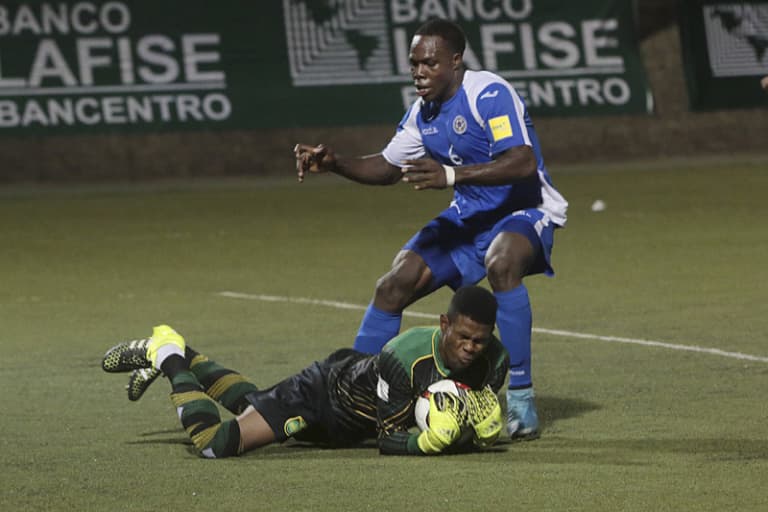
dlCatalogctl00lblImageCaption">Jamaica goalkeeper Andre Blake saves the ball in front of Nicaragua's Luis Copete during their 2018 World Cup qualifier at the national stadium in Managua, Nicaragua, on September 8, 2015. REUTERS/Oswaldo Rivas
IT SEEMS HARD TO BELIEVE NOW, but it was only last summer when Blake was called up to Jamaica for the Gold Cup — only to serve as the team’s third-string goalkeeper. He didn’t play a single minute, watching from the bench as the Reggae Boyz became the first-ever Caribbean nation to make the final.
Could they have taken it a step further and won the whole thing with an in-form Blake between the posts? Does Blake think about what might have been had he not still been recovering from an injury? What if Jamaican head coach Winfried Schäfer had rolled the dice with him anyway, even though he wasn’t seeing any action with the Union?
“You know, it was great and for me, I was just happy for the guys,” Blake says diplomatically. “I knew my injuries were a big factor – that was a mental thing for me to know that, ‘Okay, I didn’t lose my spot for not playing well. It was because of injuries – something I cannot control.’ And believe it or not, even though I did not play a game in the Gold Cup, I walked away from it with a lot of experience. And I walked away from it being a better goalkeeper.”
Blake regained his starting spot just a few months later during World Cup qualifying, and started again during June’s Copa America Centenario, making some more brilliant saves even though the Reggae Boyz failed to get out of a brutal group that also featured Mexico, Uruguay, and Venezuela.
Still, the Jamaican boss believes the 25-year-old MLS star has another level he can reach, invoking how German legend – and his former pupil – Oliver Kahn struck fear in opposing players’ hearts.
“The striker from the other team has to be like, ‘Oh my god, Blake is in goal,’” Schäfer says. “He’s one of the best goalies in CONCACAF. But I am sure he can take the next step.”
And what might that next step be?
“He has the quality to be a very good goalkeeper in Europe,” Schäfer says. “But he needs time. He cannot go to Bayern [Munich] direct No. 1. He has to fight.”
Others that know him well believe playing in a top European league is a realistic goal. His old coach, Ray Reid, says he thinks Blake will be in the English Premier League soon. And his current one has gone as far as saying that he hopes it will happen, even if that means losing one of his best players.
“My hope for him is to someday play at Manchester United,” Curtin says. “I think he has that ability.”
Considering Blake grew up a Manchester United fan – he enjoyed watching goalkeeper Edwin van der Sar – that would certainly be the ultimate dream. But Blake insists that even though Europe might be “somewhere in the back of my head,” all of his energy is currently devoted to his current club.
That kind of sentiment wouldn’t surprise his teammates, who have seen the 2016 AT&T MLS All-Star manage all of the hype perfectly this season.
“One of the things he’s done really well is he hasn’t let any of that get to his head,” Rosenberry says. “From the beginning of the year, there’s been a lot of talk about him. And he’s lived up to it, to say the least – maybe even more. That’s what’s great about him – he’s a humble guy that just kind of keeps his head down and keeps working hard.”
THE WORD is MLSsoccer.com's regular long-form series focusing on the biggest topics and most intriguing personalities in North American soccer.


